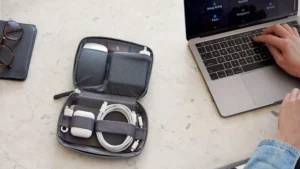From the moment we wake up to the moment we go to sleep, technology is an essential part of our daily lives. We use our smartphones for work, communication, and entertainment, but many people aren’t using their full potential. You don’t have to be a techie to make your online life smoother, more secure, and more efficient. With a few simple adjustments, you can make everything run more smoothly and get more done. This article offers some basic tech tips that everyone can use to improve their daily interactions with technology.
Making Your Device Run More Efficiently
One of the most common problems people face these days is slowing down their devices. Before you buy a new device, try these simple steps to make your older device run more smoothly. A good place to start is by regularly clearing the cache for your apps and browser. This temporary data accumulates and can slow down your device’s performance. Also, take a moment to check your installed apps. Uninstalling apps you no longer use frees up space on your device and prevents them from running in the background, which can drain battery life and processor power. Managing your startup programs is crucial for your computer. Many programs are set to start automatically when you turn on your computer, which can lead to longer boot times. Preventing non-essential programs from starting automatically can help you get started faster.
Making the Internet Safer
Protecting your personal information online is more important than ever. Setting up two-factor authentication (2FA) for all important accounts, such as email, social media, and banking, is a simple and effective way to protect your data. This adds an extra layer of security because, in addition to your password, you’ll also need to enter a verification code sent to your phone via SMS. Using a password manager is another good way to change your passwords. These programs create and store secure, unique passwords for all your accounts, so you only need to remember one master password. This prevents the risk of using the same password on multiple websites. Finally, be careful when using public Wi-Fi. While easy to use, they aren’t always secure. If you absolutely must, consider using a virtual private network (VPN) to encrypt your connection. This protects your data from theft.
Optimizing Productivity
If you configure your electronic devices correctly, they can be a significant help. Organizing your digital workspace is a simple and practical tip. Create a clear folder structure on your computer so you can file documents logically. Organize your apps into folders on your phone based on their purpose, such as “Work,” “Finance,” or “Entertainment.” This helps you quickly find what you need and stay organized. Learning keyboard shortcuts for your most frequently used apps is another great way to boost your productivity. Simple actions like Ctrl+C (Copy), Ctrl+V (Paste), and Ctrl+Z (Undo) can save you a lot of time throughout the day. Be sure to change your notification settings. Frequent notifications and pop-ups can be very distracting. Turn off unnecessary notifications to help you focus on what you’re doing.
Making the Most of Social Media
Social media sites are designed to keep you engaged, but you can customize them to your needs. Most platforms offer the ability to block or unfollow accounts without completely cutting off contact. This is a great way to manage your feed, so you see more content that appeals to or inspires you and less content that distracts. You can also create custom lists on Facebook and Twitter (formerly Twitter) to group specific people or pages. This way, you can stay connected with specific groups (like close friends, family, or news in your industry) without being overwhelmed by the main feed. To maintain your mental health, consider using built-in digital well-being tools to limit the amount of time you spend on social media each day. This can help you be more mindful of your use and avoid mindless browsing.
Unlock a Better Digital Life
The integration of technology into our lives shouldn’t make life harder but easier. You can use these simple tips to improve the efficiency of your devices, enhance your online security, increase your productivity, and have a better social media experience. Taking small, practical steps is essential to taking control of your digital space. These tips will help you get things done daily.
FAQs
1. How often should I clear my device’s cache?
You should clear the cache for your web browser and frequently used apps every one to two months. If you notice that a particular app or your smartphone is running slowly, clearing the cache is a beneficial place to start.
2. Is using a free password manager safe?
Many reputable companies offer reasonably secure free password managers. They use strong encryption to protect your data. Make sure you choose a reliable and highly rated password manager to ensure your data is safe.
3. What’s the easiest way to learn keyboard shortcuts?
Start small. Identify two or three things you do frequently, such as saving, copying, or pasting documents. Find the shortcuts for these actions and try them out. Once these shortcuts become second nature, you can learn more.
4. Does muting someone on social media let them know?
No, you can mute accounts on all major social media sites, such as Instagram, Facebook, and X (formerly Twitter), without the user knowing. This is a private way to control what you see in your News Feed.
5. Does a VPN really protect me on public Wi-Fi?
Yes, a VPN is a fantastic way to keep your data safe on public Wi-Fi. It creates an encrypted “tunnel” for your internet traffic, making it unreadable to anyone trying to snoop on the network. This helps keep private data, such as credit card numbers and passwords, safe.




